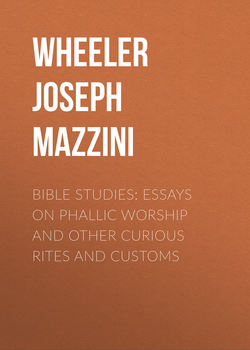Читать книгу Bible Studies: Essays on Phallic Worship and Other Curious Rites and Customs - Wheeler Joseph Mazzini - Страница 4
MOSES AT THE INN
ОглавлениеAnd it came to pass by the way in the inn, that the lord met him, and sought to kill him. Then Zipporah took a sharp stone, and cut off the foreskin of her son, and cast it at his feet, and said,
Surely a bloody husband art thou to me.
So he let him go: then she said,
A bloody husband thou art, because of the circumcision.
—Exodus iv. 24-26.
Anyone who wishes to note the various shifts to which orthodox people will resort in their attempts to pass off the barbarous records of the Jews as God's holy word, should demand an explanation of the attempted assassination of Moses by Jehovah, as recorded in the above verses. Some commentators say that by the Lord is meant "the angel of the Lord," as if Jehovah was incapable of personally conducting so nefarious a piece of business. Bishop Patrick says "The Schechinah, I suppose, appeared to him—appeared with a drawn sword, perhaps, as he did to Balaam and David." Some say it was Moses's firstborn the Lord sought to kill. Some say it was at the child's feet the foreskin was cast, others at those of Moses, but the Targums of Jonathan and Jerusalem more properly represent that it was at the feet of God, in order to pacify him.
The story certainly presents some difficulties. Moses had just had one of his numerous interviews with Jehovah, who had told him to go back to Egypt, for all those are dead who sought his life. He is to tell Pharaoh that Israel is the Lord's firstborn, and that if Pharaoh will not let the Israelites go he will slay Pharaoh's firstborn. Then immediately follows this passage. Why this sudden change of conduct towards Moses, whose life Jehovah was apparently so anxious to save?
Adam Clarke says the meaning is that the son of Moses had not been circumcised, and therefore Jehovah was about to have slain the child because not in covenant with him by circumcision, and thus he intended [after his usual brutal fashion] to punish the disobedience of the father by the death of the son. Zip-porah getting acquainted with the nature of the case, and the danger to which her firstborn was exposed, took a sharp stone and cut off the foreskin of her son. By this act the displeasure of the Lord was turned aside, and Zipporah considered herself as now allied to God because of this circumcision. Old Adam tries to gloss over the attempted assassination of Moses by pretending it was only a child's life that was in danger. But we beg the reader to notice that no child is mentioned, but only a son whose age is unspecified. Dr. Clarke can hardly have read the treatise of John Frischl, De Circumcisione Zipporo, or he would surely have admitted that the person menaced with death was Moses, and not his son.
Other commentators say that Zipporah did not like the snipping business (although she seems to have understood it at once), and therefore addressed her husband opprobriously. Circumcision, we may remark, was anciently performed with stone. The Septuagint version records how the flints with which Joshua circumcised the people at Gilgal were buried in his grave.
A nice specimen of the modern Christian method of semi-rationalising may be found in Dr. Smith's Bible Dictionary, to which the clergy usually turn for help in regard to any difficulties in connection with the sacred fetish they call the word of God. Smith says:
